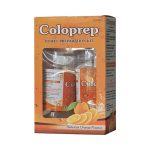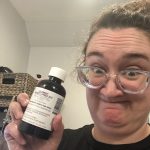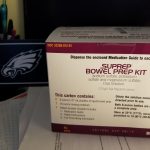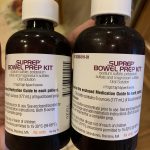How Long Does It Take To Feel Coloprep Effects?
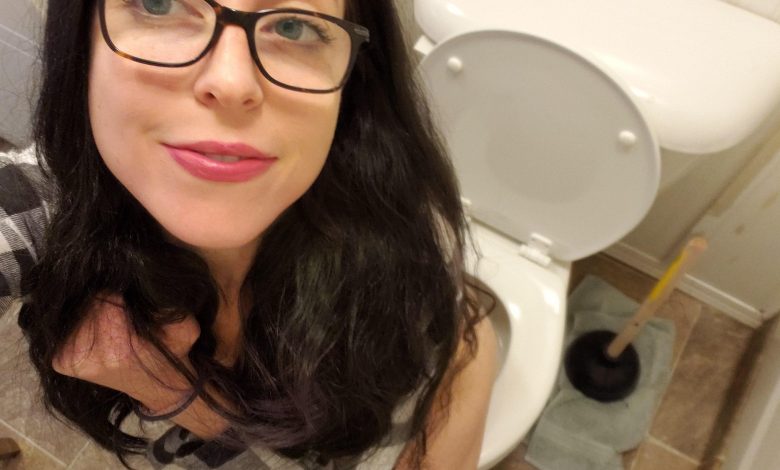
Coloprep Kit consists of two bottles of Coloprep solution in a pack, it is a bowel preparation kit which is available in different flavors. Each Coloprep Bowel Prep 6-ounce bottle contains sodium sulfate 17.5 grams, potassium sulfate 3.13 grams, and magnesium sulfate 1.6 grams. Inactive ingredients include sodium benzoate, NF, sucralose, malic acid FCC, citric acid USP, flavoring ingredients, purified water, USP. The solution is a clear to slightly hazy liquid. The solution is clear and colorless when diluted to a final volume of 16 ounces with water.
Magnesium, potassium, and sodium are electrolyte minerals that occur naturally in body fluids and they are used in a laxative that works by increasing the amount of water in your intestines and helps your bowels to move more quickly.
Coloprep Bowel Prep causes diarrhea for the purpose of cleaning your colon before a colonoscopy. Cleaning the colon allows the inside of your colon to be seen more clearly on the colonoscopy. Coloprep is for use in adults and children at least 12 years old.
Colorectal cancer is the third-leading cause of cancer deaths in the U.S.. To rule out this cancer, experts recommend colorectal cancer screening — such as a colonoscopy. But, as of 2020, approximately 20% of people between 50 to 75 years old had never been screened for colorectal cancer.
It’s important to follow preparation instructions to help your doctor get high-quality images of your colon during the colonoscopy. Poor preparation could lead to lower-quality images.
If your gastroenterologist doesn’t have clear photos from the procedure, they’re more likely to miss seeing something that could be concerning, like a polyp. A polyp is an extra growth in your colon. And though most are not dangerous, some may turn cancerous. If images show a polyp, it’s removed and tested. But, if the colon images are of low quality, you may have to repeat your colonoscopy so your doctor can be sure no polyps were missed.
Many people feel that preparing for a colonoscopy is more difficult than the colonoscopy itself. Fortunately, more prep kit options like Coloprep are now available to make preparing for the procedure a little more pleasant.
How should I take Coloprep Bowel Prep?
Use the Coloprep Bowel Prep exactly as prescribed by your doctor. Follow all directions on your prescription label and read all medication guides or instruction sheets.
Never use an adult-strength bowel prep kit on anyone 12 to 18 years old.
Carefully follow all instructions about what to eat or drink in the days before your colon prep.
You must dilute Coloprep with water before drinking it. Drinking the pure liquid can increase your risk of nausea, vomiting, or dehydration.
Do not eat solid food once you start taking Coloprep.
You will need to drink extra water once you start your colon prep. Drink only clear liquids and avoid alcohol, milk, or any drink that is red or purple.
Coloprep can cause severe dehydration, which can lead to a serious electrolyte imbalance, seizures, or kidney failure. Call your doctor if you are sick with vomiting and cannot drink enough water for your bowel prep, or if you have a headache, dizziness, or decreased urination.
How long does it take to feel Coloprep effects?
Coloprep effects can start quickly for some people. However, most people will expect a bowel movement about 1 hour after beginning Coloprep. Very watery bowel movements are expected with this medication. Nausea, vomiting, bloating, or stomach/abdominal cramping may occur. If any of these effects persist or worsen, tell your doctor or pharmacist promptly. You should follow all the directions as prescribed by your provider. If you haven’t had a bowel movement by midnight the night before your procedure, you’ll need to call your healthcare provider for further instructions.
Coloprep Bowel Prep side effects
Get emergency medical help if you have signs of an allergic reaction to Coloprep: hives; difficult breathing; swelling of your face, lips, tongue, or throat.
Call your doctor right away if you have:
• a headache and dizziness;
• little or no urination;
• severe nausea or vomiting;
• painful bloating or stomach cramps;
• trouble drinking liquids;
• mouth sores;
• a seizure;
• irregular heartbeats; or
• worsening gout symptoms (joint pain, redness, or swelling).
Common Coloprep side effects may include:
• stomach pain or discomfort;
• nausea, vomiting; or
• mild bloating.
This is not a complete list of side effects and others may occur. Call your doctor for medical advice about side effects. You may report side effects to FDA at 1-800-FDA-1088.

